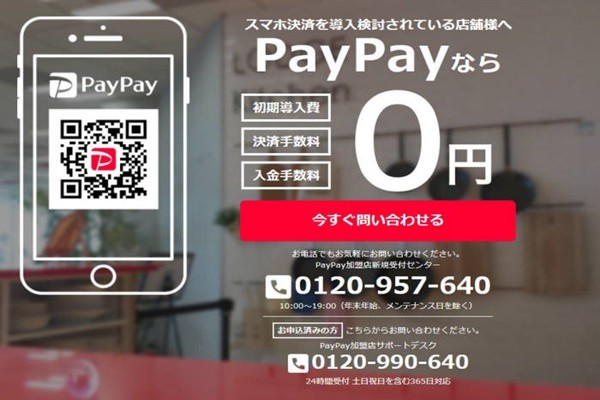Recently, stocks of new iPads, Apple Watches, and AirPods have run short at major Japanese electronic retail stores such as BIC Camera and Yamada Denki. Even expensive monitors, DSLR cameras, lenses, and latest cordless vacuum cleaners have been sold like hot cakes. At the same time, new products that are not even opened are being sold 10% cheaper on sites where used items are sold.
According to Japanese representatives and South Korean IT communities, a so-called ‘PayPay’ phenomenon is taking place in Japan. ‘PayPay’, which is a new simple settlement service established by Softbank and Yahoo, is currently carrying out an event that refunds 20% of a settlement if it is under $2,221 (2.5 million KRW).
Total amount of refund that PayPay is going to give back is $88.9 million (100 billion KRW) during this event. Because people can also accumulate points from stores, stores that still have stocks of popular products are seeing a constant stream of buyers.
PayPay is a mobile settlement service that was launched by PayPay Holdings, which is a joint company between Softbank and Yahoo, last fall. It is also connected to India’s biggest settlement service provider called PayTM that received investments from Softbank Vision Fund.
PayPay provides its service through a barcode or a QR code at an offline store. Stores that have adopted PayPay’s QR settlement do not have to pay any money for adopting PayPay’s QR settlement system or for settlement and deposit. However, PayPay is planning to have stores pay fee for settlements and deposit starting from 3 years after the start date of PayPay’s service and October of 2019 respectively. If total amount of settlements in single day surpasses $88.77 (10,000 Yen), money will be deposited into store accounts on the following day.
One can also use Alipay’s service through PayPay’s code. There is also zero fee for Alipay’s settlement. Stores that have adopted Alipay can also use PayPay as well.

Japanese society has deep tradition of paying things with cash. Percentage of settlements using credit cards is only 20%. Japanese Government is currently pushing for a ‘society without cash’ by increasing this percentage to 40% until 2025 and 80% in long term. At the same time, mobile simple settlement services such as Rakuten and LINE Pay are also looking to grab upper hands in relevant markets.
PayPay, which is relatively a newcomer in this industry, is expanding its customers and franchise stores based on Yahoo Wallet customers who have more than 40 million accounts and Softbank’s knowhow in relevant businesses. This aggressive payback event is also PayPay’s plan to secure large number of customers and strengthen its power of the market.
PayPay’s payback event will be held until the 31st of March. A person can receive up to $444 (500,000 KRW) of payback per month. This means that a person can purchase up to $8,885 worth of products during this event period and receive $1,777 (2 million KRW) in payback. However, this event can early when PayPay gives back $88.9 million (100 billion KRW) to its customers.
Another interesting element of PayPay is its wide range of franchise stores. Franchise list that was introduced by PayPay includes major home appliance retail stores such as BIC Camera, Yamada Denki, Sofmap, and Edion, food and beverage franchises, convenience store franchises, and household item franchises. PayPay’s plan is to secure large-scale infrastructures that can provide its settlement service early and secure customers afterwards by providing convenient settlement service.
“Unlike South Korea’s Zero Pay, QR settlement services are becoming generalized in China as WeChat Pay and Alipay are competing against one other by investing huge amount of funds.” said a representative for a FinTech company. “Japanese companies are also competing against one another to grab upper hands of relevant markets.”
Staff Reporter Park, Jungeun | jepark@etnews.com